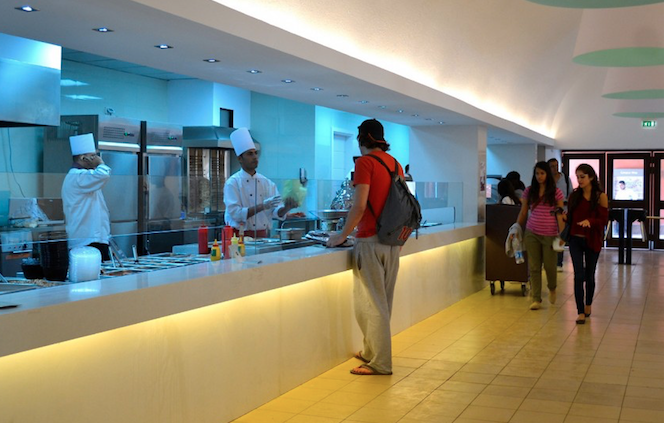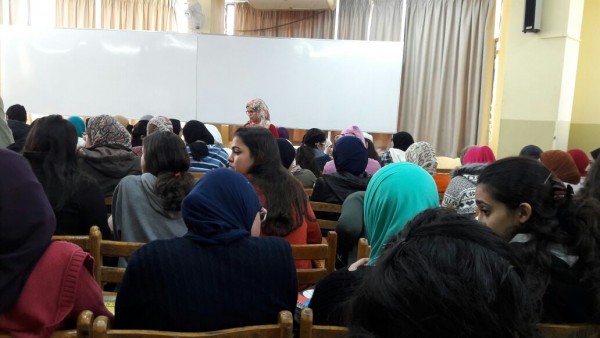Students with Food Allergies Find Few Campus Options
BY KHELOUD BADR
Follow @luluweary
Students with food allergies face a daily struggle to find food outlets on campus which accommodate to their wants and needs.
They are calling on the university to implement better food management strategies that can improve awareness of dietary and nutritional issues on campus.
Currently, there are no food outlets specialized for those with food allergies. For example, there are no gluten or dairy free options for those who are allergic to these ingredients.
Egyptology major Mariam Ghorab is lactose intolerant and allergic to all dairy products.
Since she was diagnosed seven years ago, she says that she experiences the usual symptoms such as, bloating, diarrhea, abdominal pain, and nausea when she eats food items containing lactose.
“I honestly think that offering food options for all people should be a priority at AUC. It is honestly sad that when I forget my food at home I am forced to starve or eat and get sick, which is no fun, obviously,” Ghorab told The Caravan.
Food allergies are common among people from all races and ages and AUC students are no exception. Some AUC students have various food allergies, such as allergies from gluten, airy, fruits, nuts and so on.
Many have experienced reactions to food allergies on AUC campus and from campus food.
“It differs from one to another, but allergic reactions have a variety of symptoms. It ranges from mild to severe. According to the response of the body, and according as well to the number of exposures,” Dr. Bassem Gamil, a physician at AUC’s clinic, told The Caravan.
“It is important to deal with these substances, especially that they can harm people far more than they can imagine,” said Dr. Gamil.
Wafaa Sadek Amin, the Senior Director of the Office of University Food Services and the Chair of the Food Services Advisory Committee, says that the issues of food allergies and healthy food options are among the priorities the university is considering.
In the meantime, the impetus is on students to be aware of the food they consume and ask questions of the vendors to determine suitability.
“Food vendors on campus follows the same practices of food markets in Egypt at large in this regard, which basically counts on the customer being conscious about food allergies he/she have, thus, they should inform the food provider about the case and ask questions about ingredients in the absence of labels,” Sadek told The Caravan.
But the AUC clinic maintains that a food labeling system would go a long way in clarifying ingredients and help students with allergies.
“Of course it would be beneficial to have certain labels telling which people whether these products are containing dairy or gluten or any other product,” said Dr. Gamil.
The clinic said that the staff handling the food must also be taught how to manage food, to avoid food contamination which leads to food allergies. For instance, if a food handler touches bread then touches chicken, a person allergic to gluten who will eat the chicken will be sick due to the contamination from the bread.
Physics major Mohamed Tamim who is allergic to any type of nuts, apples, oranges, and others says he also hopes for better diverse food options at AUC campus.
Tamim says that he has not had any allergic reaction at campus, but still feels better food management and control on campus is necessary.
“If you do not know what is in what you’re eating or drinking, then there is a chance that you might get an allergic reaction from something you’re allergic to, because you weren’t informed. I 100% agree with labeling food products and managing them better,” Tamim told The Caravan.
Dr. Gamil said that the clinic is willing to collaborate with AUC’s administration and create an awareness program for the food handlers, faculty and students.
Other universities have developed food programs which cater for students and faculty with food allergies. At Baylor University in Texas, for example, there is a wide range of gluten-free food items in the dining services at campus. The university has started offering gluten-free options since 2012, due to students’ demands.
The University of North Carolina offers a comprehensive training program for the dining staff and offers a program about food allergies.
Sadek says that there need to be updates and cooperation with campus vendors to ensure healthy options.
“I would like to confirm that we always work closely with Medical Services in matter related to Healthy Initiatives. Dr. Mohamed Amin, has commenced a University Healthy Advisory Committee (UHAC), and food services is part of that.”



